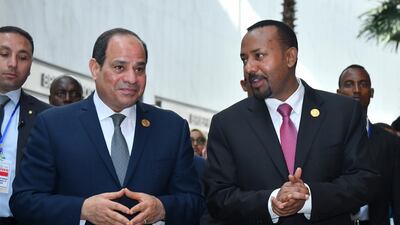Ethiopia has accused Egypt of bringing a “colonial mindset” to negotiations on the operation of a megadam that Addis Ababa is building on the Blue Nile.
The Grand Ethiopian Renaissance Dam is seen by its downstream neighbours Egypt and Sudan as an existential threat to their share of water from the Nile.
Following the breakdown of a fourth round of talks to reach agreement on the operation of the Gerd, the Ethiopian Foreign Ministry said Egypt had “erected roadblocks against efforts towards convergence”.
After the talks in Addis Ababa ended on Tuesday, Egypt said it “now reserves its guaranteed right under international charters to defend its water and national security if it comes under threat”.
While Ethiopia sees the $5 billion dam as a vital power source for its economic development, Egypt and Sudan say it threatens vital water resources.
Cairo has repeatedly tried to get Addis Ababa to sign a legally binding agreement on the operation of the dam.
However, Ethiopia has refused to be bound by a deal and has said that “recommendations” should suffice to quieten its downstream neighbours' fears that the Gerd threatens their water and agricultural security.
Now that negotiations have fallen through yet again, Egypt's Ministry of Water Resources and Irrigation said on Tuesday that it has resolved to “closely monitor the filling and operation of the renaissance dam,” without giving further details.
Addis Ababa, it continued, is negotiating only to win an endorsement from Egypt and Sudan to exert its absolute control over the Blue Nile.
“It has become clear that the Ethiopian side is determined to use the negotiations as cover to enshrine the de facto situation on the ground,” said the Egyptian water ministry.

However, Addis Ababa said it had “endeavoured and keenly engaged with the two lower riparian countries to address the major issues of difference and reach an amicable agreement”, in its rebuttal to Egypt on Wednesday.
“Ethiopia also rejects the misrepresentation of its position by Egypt,” the Ethiopian Foreign Ministry said.
The dam, which completed its fourth and final filling in September, has become one of the most contentious issues in Egyptian domestic politics and remains a large concern for its government and populace, who see it as an existential threat.
Though earlier on in the dispute with Ethiopia, Egypt hinted at intervening militarily to end the dispute, a stronger emphasis has been placed on diplomacy in recent years.
A mostly desert nation, Egypt is ranked among the world's driest countries, with the Nile the source of more than 95 per cent of its freshwater needs.


